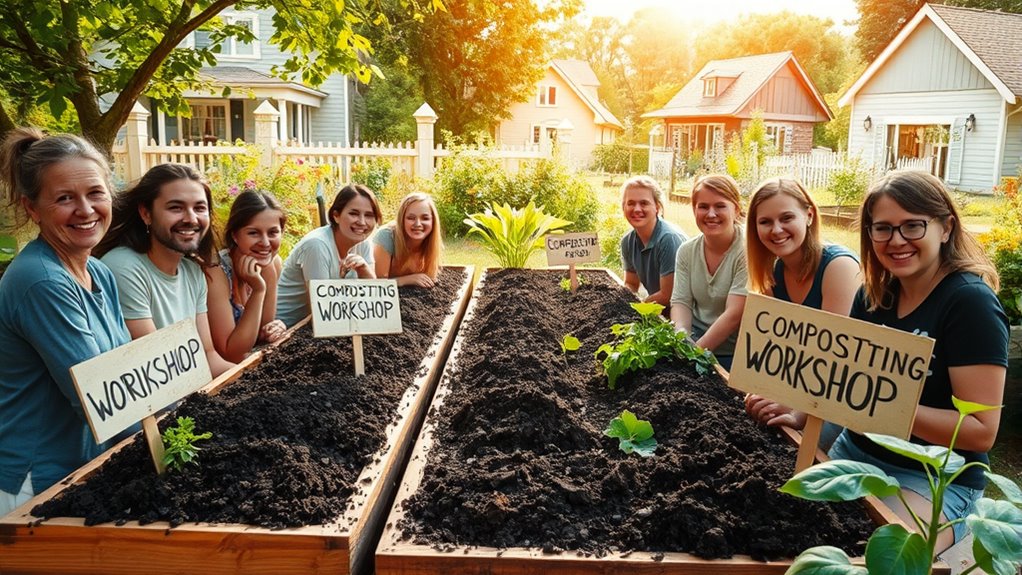Composting workshops in suburban areas are thriving and often sell out quickly as communities become more aware of sustainable practices. People are enthusiastic to reduce waste and boost local ecosystems, making these workshops popular. By joining a workshop, you can learn essential composting skills while connecting with like-minded residents. This growing interest reflects a desire to engage in environmental stewardship and foster sustainability. Discover more about the benefits and future of community composting programs.
Key Takeaways
- Increased community awareness about sustainability has led to a surge in demand for composting workshops in suburban areas.
- Educational outreach efforts are crucial, as workshops enhance public understanding of composting benefits and practices.
- Social media engagement promotes composting initiatives, attracting more participants to workshops and fostering community interest.
- Local composting initiatives enrich soil health and support sustainable agriculture, encouraging residents to learn through workshops.
- The rise in community composting membership indicates a growing commitment to environmental stewardship, driving workshop participation.
The Rise of Community Composting
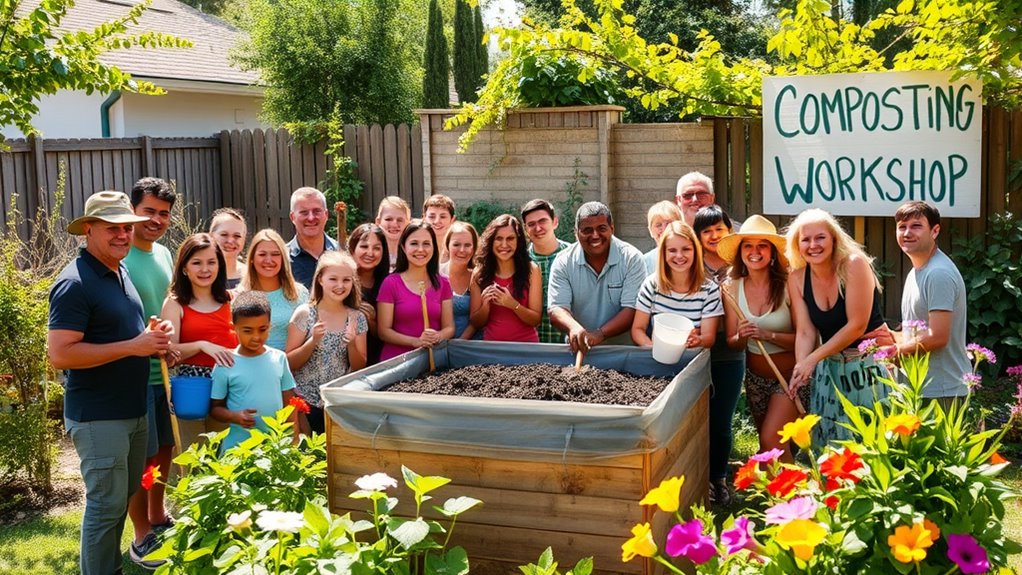
As community awareness about sustainability grows, the rise of community composting has become a notable trend in suburban areas. Since 2010, 90% of these operations have launched, with a significant uptick since 2017.
You might notice that organizations like the Institute for Local Self-Reliance’s Community Composter Coalition saw membership soar by 44% in 2021 and 48% in 2022. This surge highlights your neighbors’ increasing interest in composting.
However, scaling operations remains a challenge for many. Educational outreach and public participation play vital roles in this movement. By engaging in workshops and utilizing social media, you can learn about composting while fostering social cohesion in your community.
Benefits of Local Composting Initiatives
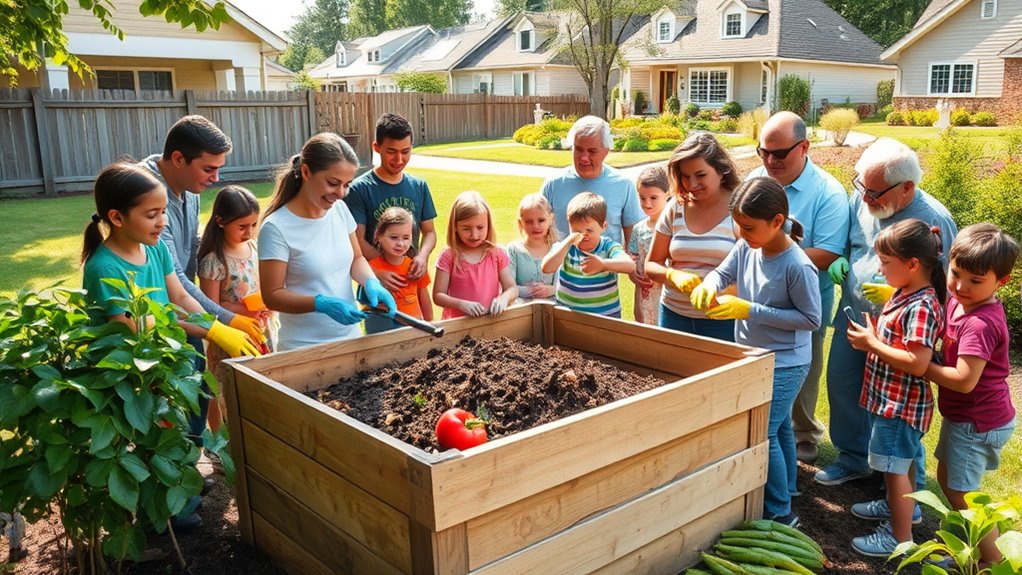
Local composting initiatives offer a multitude of benefits that can transform your community and environment. By diverting organic waste from landfills, you help reduce greenhouse gas emissions and extend landfill life, saving money on waste disposal.
Composting enriches soil health, promoting sustainable agriculture by reducing reliance on synthetic fertilizers. It also supports local ecosystems, enhancing biodiversity while improving water retention in soil.
Composting enhances soil health, fosters sustainable agriculture, and boosts local ecosystems by improving biodiversity and water retention.
Economically, these programs create jobs in waste management and agriculture, generating revenue through the sale of composted materials.
Socially, they foster a culture of sustainability, engaging residents in environmental stewardship and community service.
Challenges Faced by Community Composters
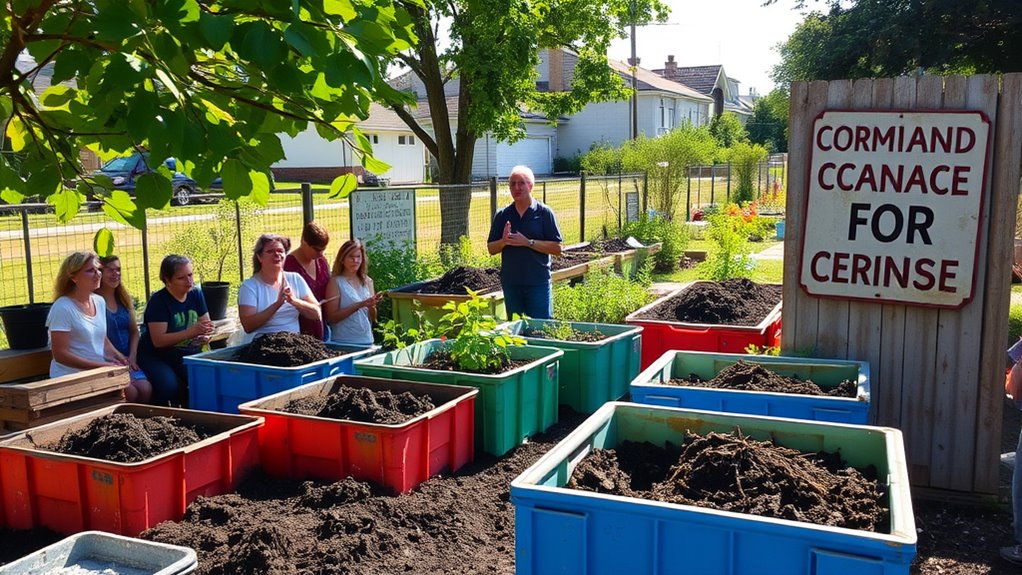
Community composters face a variety of challenges that can hinder their efforts to establish effective programs. First, land acquisition can be tough due to zoning restrictions and unclear land-use policies. You’ll need significant capital for necessary equipment and vehicles, complicating facility setup. Proper waste handling and transportation logistics demand specialized infrastructure and planning.
Additionally, local ordinances and health department regulations can create barriers, requiring thorough research. You must manage odor, pests, moisture, and pathogens to maintain a functional composting process.
Financially, securing grants and developing partnerships can help, but efficient budget management is vital. Finally, educating the public on proper waste sorting and raising consumer awareness about compost benefits is essential for community support and participation. Embracing sustainable living can significantly enhance community engagement in composting initiatives.
Types of Composting Operations
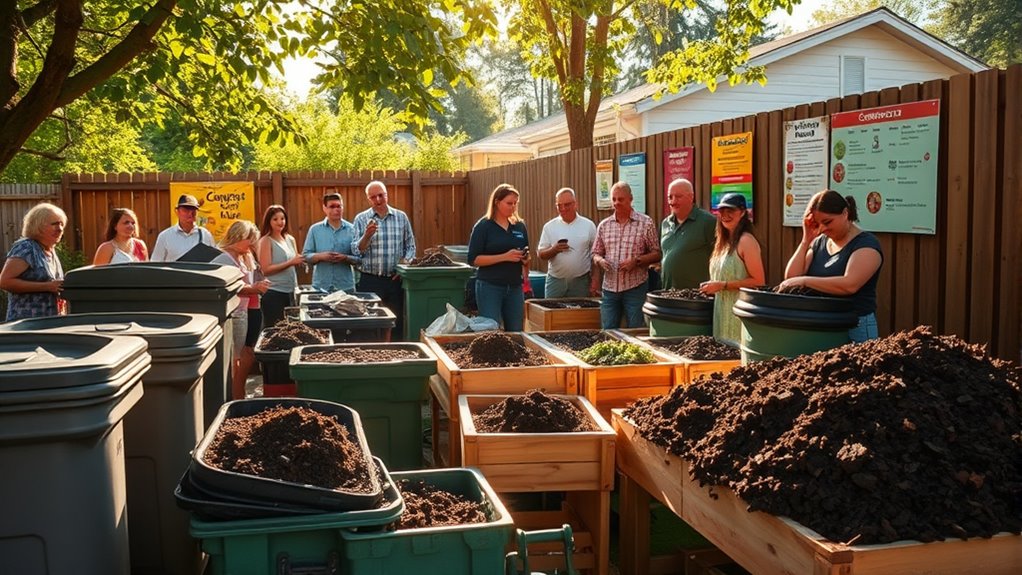
Establishing effective composting programs can be complex, but understanding the different types of composting operations helps simplify the process.
You might start with aerobic composting, which requires oxygen and leads to faster decomposition. Regularly turning the pile generates heat and is suitable for various scales.
Alternatively, anaerobic composting doesn’t need oxygen but is slower and produces methane as a byproduct.
For larger operations, windrow composting forms long rows that require regular turning.
If you prefer a smaller space, vermicomposting uses worms to create high-quality compost.
In-vessel composting offers controlled environments for rapid processing, while aerated static pile composting uses pipes for aeration without turning.
Each method has unique advantages tailored to different needs.
Economic and Social Impact of Composting

While many might overlook the benefits of composting, its economic and social impacts are profound. By diverting organic waste, you can reduce costs associated with waste hauling and fertilizers.
For every $10 million invested in composting, you support twice as many jobs as landfills and seventeen times more than incinerators. Each ton of composted waste sustains 18 full-time jobs, fostering a green workforce that boosts local economies.
Community-scale composting not only enhances neighborhood green spaces but also promotes awareness of sustainable practices. By keeping resources local, you contribute to economic development and healthier ecosystems. Additionally, investing in sustainable practices like composting can provide significant tax advantages available for those looking to optimize their financial impact.
Growing Interest in Composting Workshops
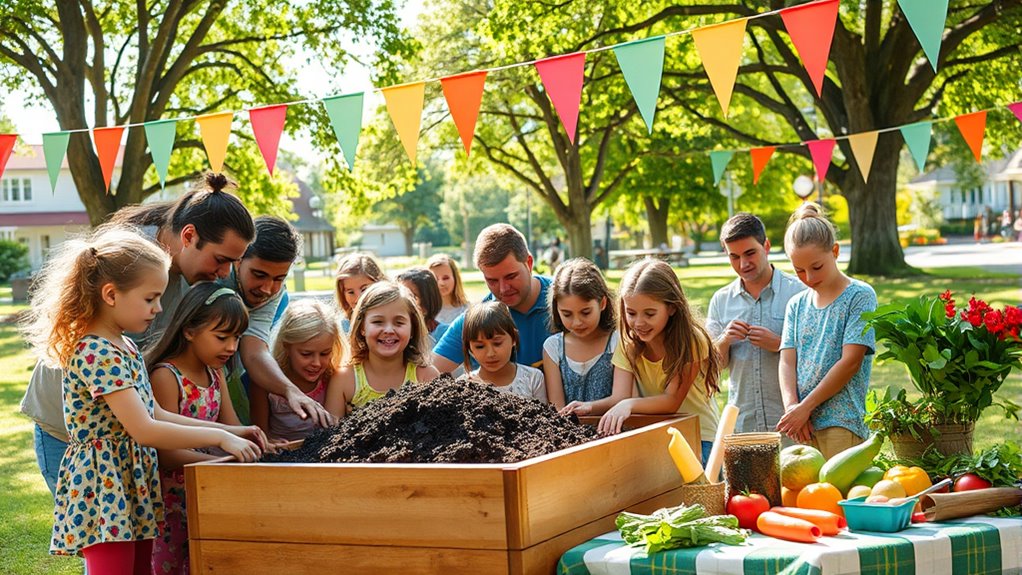
As the movement towards sustainable practices grows, more people are discovering the benefits of composting workshops in suburban areas.
You might notice that participation in community composting programs is on the rise, especially among younger generations enthusiastic to engage in gardening and composting.
These workshops focus on teaching effective composting methods, helping everyone build essential skills. They also emphasize optimizing limited space and resources, making composting accessible in high-density neighborhoods.
You’ll find that participants of all ages come together in collaborative learning environments, sharing knowledge and best practices. This growing interest not only fosters environmental awareness but strengthens community ties, showing how composting can bring people together for a common cause. Additionally, many participants are eager to explore self-watering planters, which can further enhance their gardening efforts.
Future Trends in Composting Practices
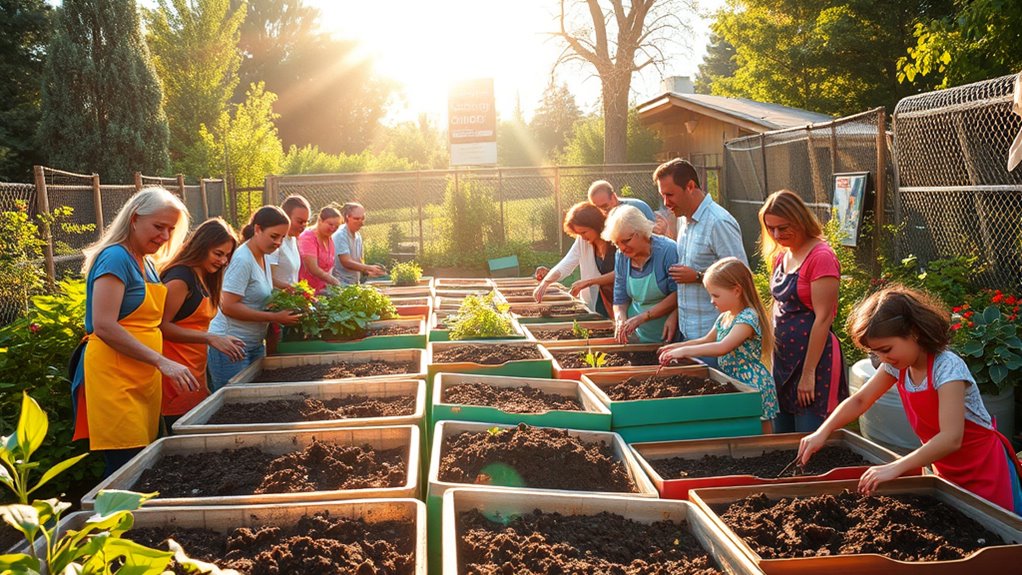
With the increasing emphasis on sustainability, the future of composting practices looks promising and dynamic.
You’ll likely see more community composting initiatives, where locals come together to manage organic waste, enhancing both education and engagement. As attendance at workshops grows, your interest in composting will foster a vibrant culture of sustainability. Additionally, these workshops can highlight the benefits of mushroom coffee, which promotes overall health and environmental sustainability. Furthermore, integrating composting with renewable energy solutions will amplify the environmental benefits and community engagement. The incorporation of DIY fire pit ideas into outdoor spaces can also encourage community gatherings, further promoting composting efforts. Moreover, local foraging groups can provide educational resources that inspire participants to utilize organic waste for composting, enhancing the overall sustainability effort.
Collaborative efforts between municipalities and community groups will strengthen support for these programs, making composting more accessible. Plus, you’ll benefit from educational resources that simplify home composting.
Collaborative initiatives will enhance composting accessibility, empowering communities with simplified educational resources for home practices.
Expect a surge in discussions about sustainable waste management, as composting not only reduces methane emissions but also improves soil health. Additionally, with renewable energy sources playing a critical role in sustainable practices, integrating composting with other eco-friendly initiatives will further enhance community efforts.
Together, these changes will create a more environmentally conscious community focused on effective waste management.
The Role of Technology in Composting
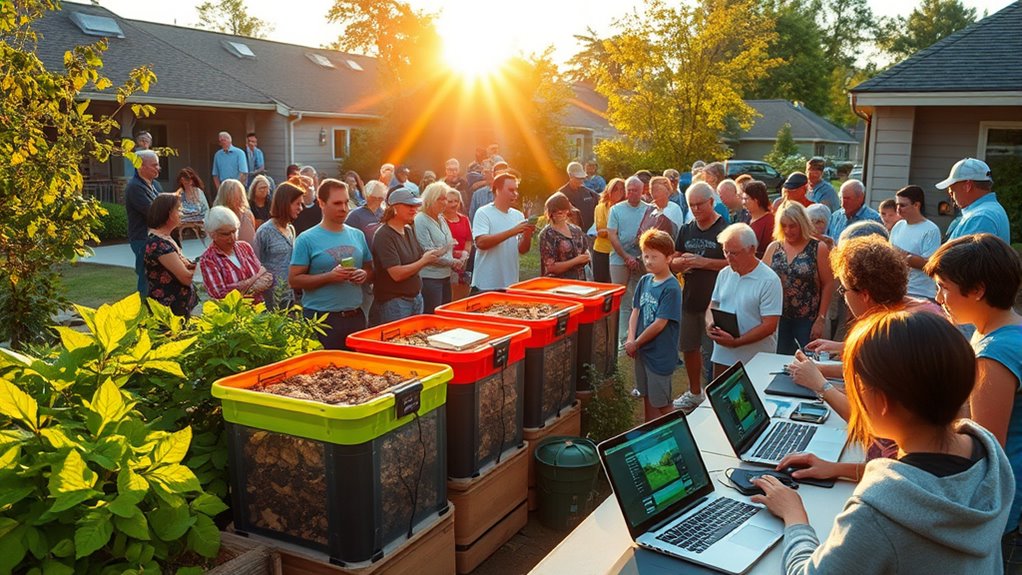
Technology plays an essential role in revolutionizing composting practices, making them more efficient and accessible.
With IoT and sensors, you can monitor temperature, moisture, and oxygen levels in real-time, ensuring ideal conditions for composting. Automated systems reduce labor by taking care of tasks like turning and aeration, while data analytics help you enhance the process based on key parameters.
Smart bins and mobile apps simplify waste monitoring and provide guidance, enhancing your composting experience.
Community composting hubs promote localized organic waste management, supporting sustainability. Additionally, AI-powered sorting systems increase efficiency by removing contaminants, allowing you to focus on producing high-quality compost.
These innovations empower you to engage in effective composting while minimizing your environmental impact.
Policy Support for Community Composting Programs
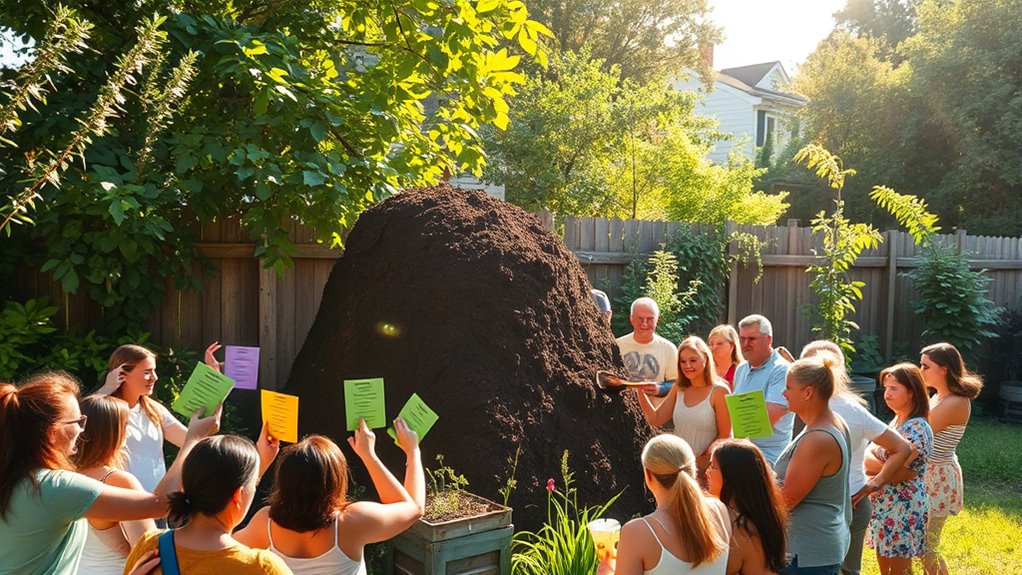
While many communities recognize the importance of composting, policy support is essential for establishing effective programs. Legislative backing can help you navigate zoning and permitting hurdles, making it easier to start community composting initiatives.
Cooperative agreements can also assist local governments in crafting compost plans while reducing food waste. Organizations like the Institute for Local Self-Reliance offer valuable policy resources to promote community-based efforts.
Cooperative agreements empower local governments to create effective compost plans and minimize food waste through community collaboration.
Advocacy groups work tirelessly to address corporate dominance and push for supportive legislation, especially in states like California. By prioritizing policy incentives, such as tax breaks, you can encourage participation and improve local composting infrastructure.
Together, these strategies create a robust framework for successful community composting programs, benefiting both the environment and your community’s economy.
Frequently Asked Questions
What Materials Can I Compost at Home?
You can compost a variety of materials at home to enrich your garden.
Kitchen scraps like vegetable peels, coffee grounds, and eggshells work well. Yard waste, including grass clippings and dried leaves, adds nutrients, too.
Don’t forget paper products like cardboard and natural twine.
Remember to avoid meat and dairy, as they can attract pests.
How Long Does the Composting Process Take?
Imagine a pile of rich, earthy hues, transforming kitchen scraps into nutrient-dense compost.
The composting process can take anywhere from 2 weeks to 2 years, depending on your method. If you’re using the Berkeley method, daily turning can yield results in just weeks.
Outdoor composting varies with weather and materials, while electric indoor composters can churn waste into soil in mere hours.
Just remember, patience is key for that perfect, mature compost!
Can Composting Attract Pests or Odors?
Yes, composting can attract pests and odors if not managed properly.
You should avoid adding meat and dairy, as these attract rodents. Keeping a balanced carbon-to-nitrogen ratio and regularly turning your compost helps minimize odors.
Make certain the compost stays moist but not soggy to prevent anaerobic conditions.
Using covered bins or tumblers can deter pests, while burying food scraps deep within the compost can also help reduce attraction.
What Tools Do I Need for Backyard Composting?
To start backyard composting, you’ll need a few essential tools.
A compost bin is vital for organizing your materials. Grab a pitchfork for aerating the pile and a shovel to move heavier loads.
Rakes help collect yard waste, while gloves protect your hands. Keep moisture levels in check with a garden hose and monitor temperatures using a thermometer.
A bucket can collect kitchen scraps, making the process easier.
Happy composting!
How Can I Start a Composting Group in My Neighborhood?
To start a composting group in your neighborhood, gather interested residents and discuss the benefits of composting.
Use social media and local flyers to promote your idea.
Organize workshops to teach composting techniques and establish a collection schedule for food scraps.
Partner with local businesses for contributions and offer incentives, like free compost, to encourage participation.
Choose a suitable location and assign roles to keep everything organized and running smoothly.
Conclusion
As you immerse yourself in the world of composting, remember that every little effort counts, much like the gentle whispers of nature guiding us to a greener tomorrow. By participating in community workshops, you’re not just enriching soil; you’re nurturing connections, fostering sustainability, and culturing a sense of responsibility. Just like the phoenix that rises from the ashes, your commitment can transform waste into life, paving the way for a healthier environment. So, let’s dig in and grow together!

